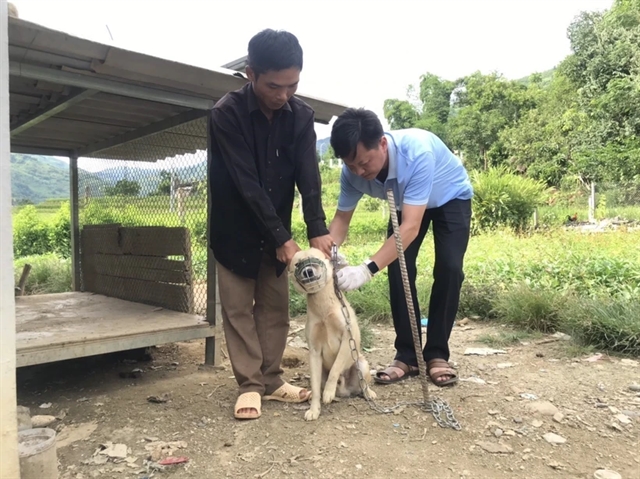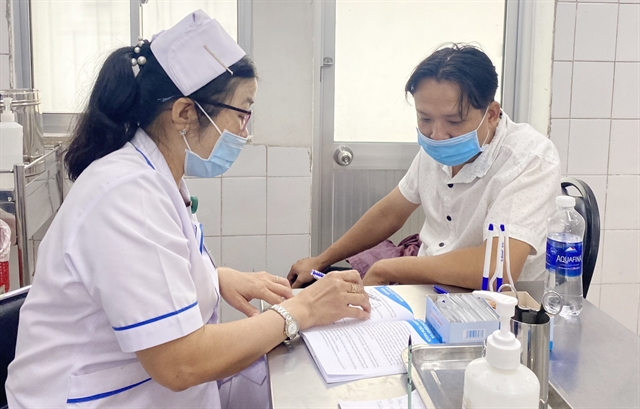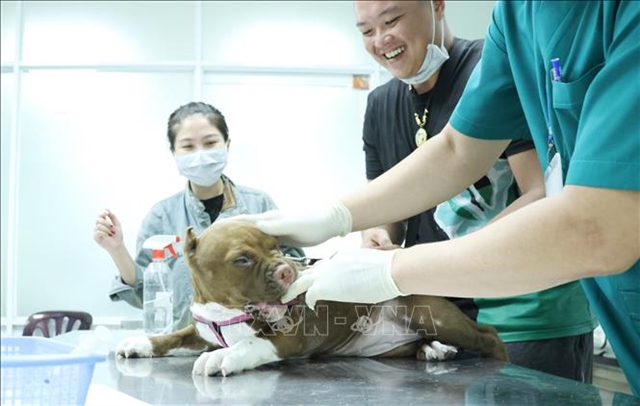 Society
Society

 |
| People get rabies vaccinations at the HCM City for Tropical Disease. The city is stepping up rabies prevention and control efforts amid rising incidence of the disease in southern and central Viet Nam. VNA/VNS Photo |
HCM CITY — HCM City is intensifying efforts to prevent rabies, whose incidence has been on the rise in many parts of southern and central Việt Nam this year.
While the city itself has not recorded any rabies cases, the presence of unleashed dogs and cats in public areas poses a risk.
Trần Huỳnh, 39, of District 5 went straight to the HCM City Hospital for Tropical Diseases to get rabies shots after being bitten by a stray dog.
He did not know the dog’s owner or whether it was vaccinated, and so decided to preclude the risk of rabies.
According to statistics from the hospital, it has been administering rabies vaccines to more than 240 people every day since February.
It has treated seven rabies patients from other provinces in this period.
All seven were in critical condition and, sadly, died.
In the first two months of this year the Pasteur Institute in HCM City administered more than 4,800 rabies shots.
The HCM City Center for Disease Control (HCDC) reports 19,552 people in the city were vaccinated during this period.
Surveys done at vaccination points by HCDC found that the culprits were dogs (74.8 per cent), cats (20.5 per cent), bats (0.2 per cent), and other animals (4.6 per cent).
More than 60 per cent of cases involved level three wounds, referring to deep bites that pierce the skin and cause bleeding or open wounds licked by an animal.
Dr Lê Hồng Nga, deputy director of the HCDC, said while the city itself had not had any rabies cases, several provinces in the south had, particularly Bến Tre Province.
The city Department of Health had provided comprehensive guidance to relevant agencies about rabies prevention and control measures, with a focus on preventing transmission to humans, she said.
According to Dr Danh Thơm, deputy head of the medical examination department at the HCM City Hospital for Tropical Diseases, the prolonged and intense hot weather makes conditions ripe for a significant rabies outbreak.
The practice of allowing dogs and cats to wander without muzzles heightens the risk of rabies transmission.
 |
| People bring their pets to the Animal Husbandry and Veterinary Sub-department in HCM City to get rabies shots. VNA/VNS Photo |
Recently the diagnostic, testing, and treatment station for animal diseases under the Animal Husbandry and Veterinary Sub-department has seen a large number of pets brought for examination and rabies vaccination.
On average, the station administers rabies vaccinations to 20-30 dogs and cats every day.
Nguyễn Hữu Thiết, deputy director of the city Animal Husbandry and Veterinary Sub-department, said there were 184,000 pet dogs and cats in the city, with around 81 per cent of them immunized against rabies.
His agency collaborated with districts and communes to encourage people to vaccinate their pets regularly and manage pets properly, he said.
The city Department of Agriculture and Rural Development wants people raising dogs or cats to register with the local administration and implant electronic chips in their pets to manage information related to breeding, vaccination, quarantine, and transportation.
It has also suggested various measures to strengthen community awareness to ensure people isolate pets with abnormal symptoms or suspected infectious diseases and promptly seek assistance from veterinary agencies or local authorities.
It also wants pets leashed, muzzled and accompanied by their owners in public places.
According to the HCDC, rabies is an extremely dangerous infectious disease without any treatment but is preventable.
When bitten, individuals should immediately wash the wound and go to a health centre to receive preventive treatment as soon as possible.
They should adhere to the prescribed vaccination schedule and strictly avoid medications that are not prescribed. - VNS




